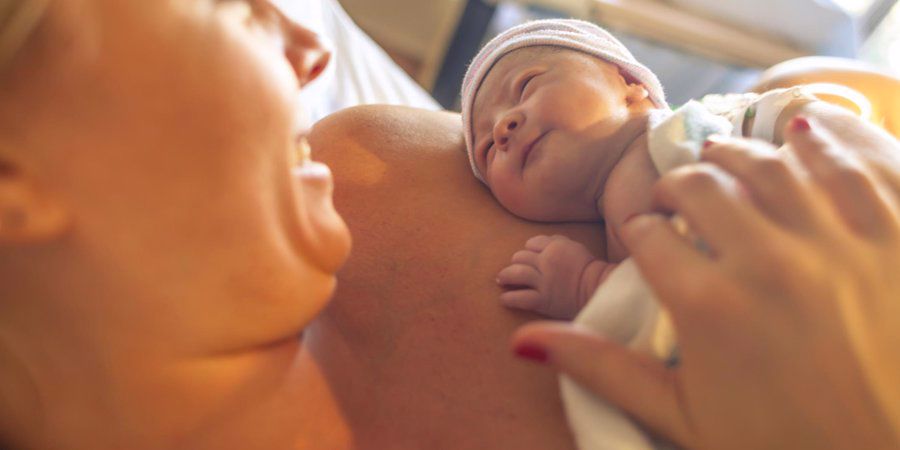Towards the end of your pregnancy, around the 37-40 week mark when you're considered 'term', you may be wondering what to expect when the time comes to push. What you may have seen on TV and in films, it's quite far from the truth, there is no theatrical bucket's worth of liquid when your water breaks - usually, and not everything we're about to tell you happens to everyone, and of course, not all babies are delivered on the day they're expected. Before 37 weeks, babies are considered premature, so always pay attention to your baby's movements and position and go straight to your birthing unit if you have any concerns or start experiencing any of the below before you've reached 'term'.
Months/Weeks before Birth
The first sign that your baby is preparing its exit is when the baby 'drops'. This early symptom and sign of labour that occurs between 2 and 4 weeks before, tends to only happen to first time mums, so veterans won't typically experience this until they're in full labour. This stage is when the baby is getting into position ready to make its exit. The baby will turn and its head will drop down into the pelvis and feel like they're resting on your bladder more than usual - which unfortunately means you'll be making far more trips to the bathroom! You may also start waddling more as their head widens your pelvis, making walking a little bit harder - at this point, you may want to start your maternity leave if you haven't already.
In the days and weeks leading up to labour in your weekly checks with a midwife or doctor, you will be told that your cervix is beginning to dilate. This happens so the baby can get into position in the birthing canal. A measurement of its diameter and effacement (thinning) will be tracked in each appointment, but don't get discouraged if it is happening slowly or not at all, it doesn't happen for everyone weeks before, it may even begin dilating the very week you go into labour. Once you reach 100% effacement and 10 centimetres dilated (this is the final stage of labour), it's time to push.
We're sorry to say, there's also more back pain to come once you're getting closer to your due date. Back pain, loose joints, cramps and loose bowel. Isn't being pregnant fun? As your baby lowers itself into position, your lower back will be under more pressure. As your body adapts to get ready for birth, you will also notice your joints becoming looser and more relaxed, eventually allowing your pelvis to come apart to fit the baby through. At this point, the muscles surrounding your uterus begin to relax, and unfortunately, this applies to your bowel. You'll have likely had issues in this department throughout your pregnancy, but we're afraid it'll be back with a vengeance once you're reaching term. This early symptom and sign of labour are completely normal at this stage, so just stay hydrated and remember, it means your baby is coming soon!
Around the last few weeks of pregnancy, another early sign of labour is when you start nesting and stop gaining weight. Every mother, like in the animal kingdom, begins nesting in the last stage of their pregnancy, feeling compelled to start cleaning, organising, decorating and preparing their home and surroundings for the new baby. This sudden burst of energy is also coupled with fatigue, so remember not to overdo it and take regular naps, At this point, your baby’s organs will be maturing and will continue to grow. You will have lower levels of amniotic fluid by this point too, so those extra pounds you may have put on will start slowly dropping off - hurrah!

Days & Hours before Birth
In the days and hours before birth is where most activity will happen. As you reach term, the first stage of labour, we're sorry to say, involves quite a bit of pain, your waters breaking and the loss of your mucus plug. The loss of the 'cork' that seals off your uterus and prevents infection is the first sign and symptom that labour is imminent. It may come out in one piece, like snot from your nose, or you might not see it at all. Some women instead see a change in their discharge, where it thickens and becomes pink. This is your 'bloody show' and is a fairly good indicator that you need to prepare yourself for your trip to the labour ward.
Without contractions, however, or 3-4 cm dilation of your cervix, labour may still be a few days away. Braxton Hicks contractions catch a lot of women out, falsely tricking the mother into thinking they're going into labour. Contractions will feel like similar to severe menstrual cramps, an upset stomach or pressure in your lower abdomen and can be felt either in your lower abdomen, your lower back and/or radiate down into your legs, though their location is not an indicator of whether or not the contractions are real. To tell if your contractions are real, they'll get stronger and more painful as they come, rather than easing up. The same applies if you try and change position; if you move and the pain eases, it's not a real contraction. Real contractions, as they get progressively stronger, should fall into a regular pattern where you can count the minutes between them. It will be time to head to the hospital when your contractions have been roughly 5 minutes apart for at least an hour or are lasting for more than a minute time.
The final early sign and symptom of labour is your waters breaking. No, not the big dramatic waterslide gush of water you've seen on TV, but the final sign of labour that women can experience, though only around 15% of women experience their waters breaking as a sign the baby is coming. Some women's amniotic sack won't rupture until right before the birth, and some will have to have their waters broken manually by their doctor.
If you think you're experiencing one of these early signs and symptoms of labour, call your doctor, but of course, if you're pretty close to pushing, get to the hospital as soon as possible. If you begin experiencing bleeding or bright red discharge, your water breaks or get double vision / a bad headache associated with preeclampsia, call your doctor immediately.
Is your partner worried about how to support you in labour? Please have a read of the article here so they can get some top tips.







